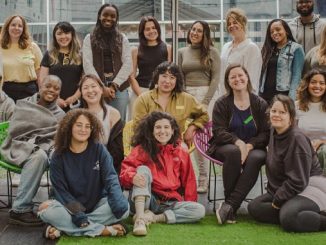We stepped into the vibrant world of Talisman Theatre, a Montreal-based, award-winning non-profit theatre company that adds a touch of Quebecois allure to the local arts scene. Renowned for staging cutting-edge English-language translations of contemporary Quebec plays, Talisman Theatre has been a pivotal force since its inception in 2006. In this exclusive interview, Lyne Paquette, artistic director of the Teatre, shares the enthusiasm that has fueled their annual production of one professional play. With over 10,000 seats filled during their live performances, Talisman Theatre is at the heart of Montreal’s English language arts, showcasing the city’s rich cultural tapestry through the lens of captivating theatre.

Describe your charity/non-profit/volunteer work in a few sentences.
Talisman Theatre is an award-winning non-profit theatre company, specialized in staging cutting-edge English-language translations of local contemporary Quebec plays. As part of the Montreal English language arts scene, we’ve produced one professional play per year, filling more than 10,000 seats for our live performances since we were founded in 2006.
What problem does it aim to solve?
Although the French and English Dance and Music Art scenes seem to live fluidly between cultures, Theatre and Spoken-Words Arts remain divided. Our goal is to fill the void between the French and English communities and build bridges through bringing the full experience of contemporary Quebec/French life to Anglophone and Allophone communities while stimulating dialogue between Montreal’s cultural minorities and Quebec’s Francophonie.
When did you start/join it?
I, Lyne Paquette, am one of the two strong women who founded Talisman Theatre in 2005. Emma Tibaldo and I studied in the National Theatre School of Canada in Directing and Set Design respectively. As we were in our late thirties, both embarking on new careers, we decided to join forces and build our own production company, promoting fetish playwrights and showcasing our and many other’s talents in the Live Performance scene.
What made you want to get involved?
When we were done with our studies, we realized that most of the interesting contemporary Quebecois playwrights were produced here in Montreal but were completely unknown to the Anglophone and Allophone theatregoers. We dreamt of building a very niche theatre production company to fill this gap, promote intercultural understanding, and empower linguistic minorities to engage with great local francophone theatre. And we did it!
What was the situation like when you started?
Interestingly, when we first started, the French local press was very attracted to our work. Talisman was nominated and won French theatre awards and critics awards, and Anglophone audiences were very curious, although it was not everyone’s cup of tea. People were noticing that the more lyrical moments in our plays were very new to theatregoers. Usually, the language in the original French productions was acting like an extra character on stage, but when experiencing a translation toward English we lose that; English is a leaner, more efficient language. Somehow our plays succeeded in filling this linguistic gap and our stories gained universal appeal.
How has it changed since?
With the rise of social justice movements, the French and Anglo art scenes seem to approach these issues differently. On one hand, French theatre aims at pushing boundaries, rattling the audience’s cage, and forcing them out of their comfort zones. Anglos, on the other hand, seem to be more fervent promoters of equity, diversity, and inclusion movements above all. This leaves us somewhere in the middle. And so, our plays polarise the audience members: they either love it or hate it. Some people attending our performances are offended by the taboos laid bare and tackled frontally. Our job becomes harder as we try to build bridges between two communities that are continuously stretching apart.
What more needs to be done?
Subsiding the societal gap between the French and the Anglophone and Allophones. Talisman needs to persevere and encourage discussion with its audience and community. We also need to carefully navigate the bridge in between these cultures. Trusting our play reading committees in identifying potential hot issues and traps in our new material is one of our many critical steps in choosing and producing a play. Our goal is to keep Anglos and Allophones engaged and committed to learning about the city they live in. The key is to take baby steps in producing socially impactful plays and accompanying the audience through each and every one of them.
How can our readers help?
Go to the theatre, especially theatre in translation here in Montreal. It is a great opportunity to understand the Quebecois culture if you don’t have the language skills to experience the stories in their original language. The translations, with their losses and gains, will open a door in your psyche, increase curiosity towards the other, make you reflect, and help you see the world from a different perspective. Come out and support English theatre in Montreal, be it through attendance, advocacy, and donations. If you’d like to support Talisman Theatre particularly, you can donate on our website, or contact us to join our family and become a volunteer.
Do you have any events coming up?
Talisman is currently producing a play called Still Life, originally written in French “Chienne.s” by Mairie-Ève Milot and Marie-Claude St-Laurent, and translated by Rhiannon Collett. This piece, directed by Emma Tibaldo, is a brilliant study of a privileged white writer, struggling with a paralyzing anxiety at the age of 30. Still Life residency was a great success at the Centaur’s Wildside festival in January, and the full production will be showing at La Chapelle Theatre in October 2024.
Where can we follow you?
Website | Instagram | Facebook
PAY IT FORWARD: What is an awesome local charity that you love?
Afghan Women’s Center




